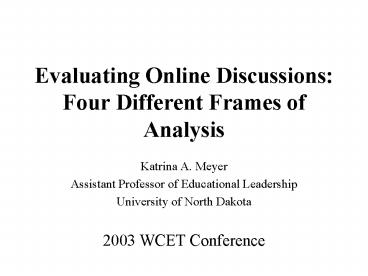Evaluating Online Discussions: Four Different Frames of Analysis - PowerPoint PPT Presentation
1 / 12
Title:
Evaluating Online Discussions: Four Different Frames of Analysis
Description:
Katrina A. Meyer. Assistant Professor of Educational Leadership. University of North Dakota ... Danger that a posting might become colored by the frame. ... – PowerPoint PPT presentation
Number of Views:44
Avg rating:3.0/5.0
Title: Evaluating Online Discussions: Four Different Frames of Analysis
1
Evaluating Online Discussions Four Different
Frames of Analysis
- Katrina A. Meyer
- Assistant Professor of Educational Leadership
- University of North Dakota
- 2003 WCET Conference
2
Four Frames
- King and Kitchener Reflective Judgment Model
- Perry Intellectual and Ethical Development Model
- Garrison et al. Critical Thinking Model
- Bloom Taxonomy of Educational Objectives
3
Findings
- Of 278 total postings, 74 were coded by all four
frames (26 dropped). - Of 206 postings, 63 or 130 postings had unique
combinations of the four frames. - Of the over 1500 possible permutations of the
four frames, only 130 combinations were found,
and 31 of these only appeared twice.
4
Findings
- 33.4 of postings captured the request for and
response from students of personal experiences
and beliefs (KK3 and P7). - 32.5 of postings were related to requesting and
responding with analyses that were either
exploring or integrating ideas (Bloom
Garrison).
5
Findings
- The type of triggering question influences the
level of response from students. - Questions created to trigger personal stories did
so and questions targeted to elicit information
or higher-level analysis did so.
6
Findings
- 45.3 were at levels 5-7 (King and Kitchener)
- 100 were at levels 5-9 (Perry)
- 52.2 were at the two highest levels (Garrison)
- 54.3 were at levels 4-6 (Bloom)
- Appropriate for doctoral-level students in a
doctoral-level class.
7
Findings
- Each frame has value.
- Each frame focuses attention on a particular
aspect or quality of the student and his/her
thinking - There is no one best frame, or perhaps one frame
might be better suited for a particular
discussion or a particularly set of learning
objectives. - Need to develop multiple frames for analyzing
online discussions intended to address different
learning situations.
8
Findings
- Perry was the most difficult framework.
- Distinctions between levels were difficult to
discern. - This may preclude it being used on a more
frequent basis.
9
Findings
- King and Kitchener was less difficult to apply.
- Both King and Kitchener and Perry are
classification schemas for an individual. - Both might work better if the discussion were set
up to generate a particular reflection or if the
post was sufficiently long to give a sense of the
students reasoning. - The level of a specific post (or even several
postings) may or may not indicate the students
predominant developmental stage.
10
Next Level of Analysis
- A stage may indicate the students primary level
of response or - A stage the group must pass through (i.e.,
information) in an effort to develop higher-level
analyses. - Use frames to analyze the ebb and flow of online
discussions as a group effort, rather than
focusing on the individual postings as a
reflection of the students level of thought.
11
Cautions
- Danger that a posting might become colored by the
frame. - Each frame focused the analysis at the same time
it eliminated other perspectives. - It is a lens that filters out AND focuses.
12
More Frames Needed
- Assessment of social presence the ability of
students to contribute in such a way as to make
their personalities come to life in their
postings. - Assessment of group functioning how online
groups work together to develop an understanding
of and solutions to a problem.































